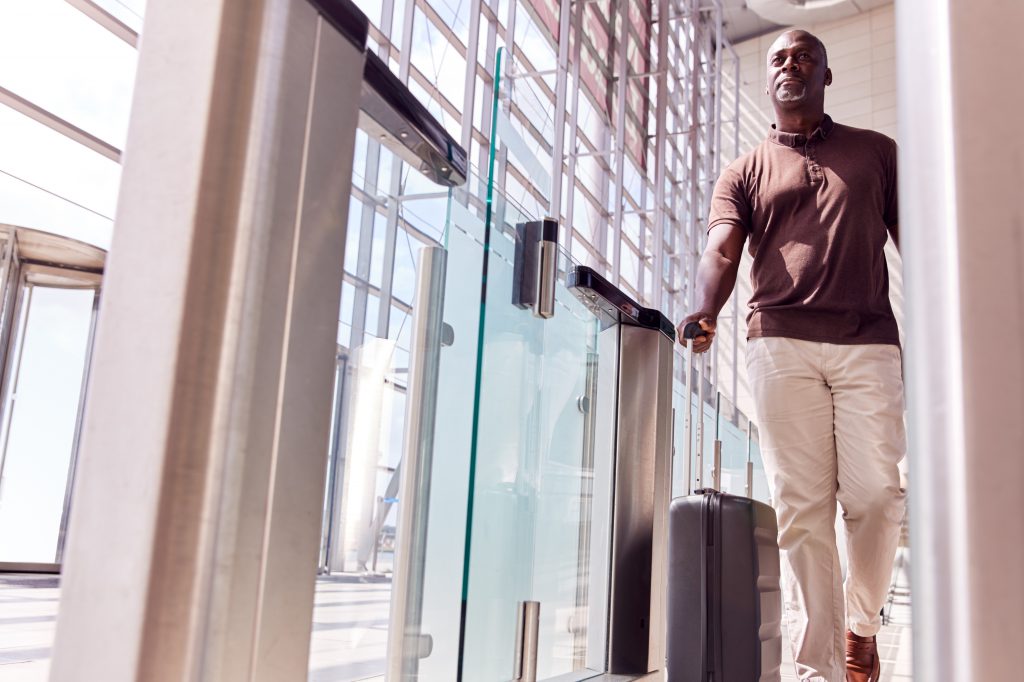After any major surgery, your healthcare provider may caution you against flying for a certain amount of time to reduce your risk of blood clots. For a total knee replacement, this time is about four to six weeks. In this post, we’ll go over what you should know about traveling after your total knee replacement, from reducing your risk of blood clots to going through airport security.
Why is flying restricted after major surgery?
Flying after major surgery, especially hip or leg surgery, may increase your risk of deep vein thrombosis (DVT). This is why doctors often recommend waiting up to six weeks after your surgery before doing any long-distance travel. DVT is a condition in which a blood clot occurs in one of the deep veins in your body, typically in one of the legs.
You may be at a higher risk for DVT if you:
- Have experienced DVT or blood clots before
- Have a family history of blood clots or DVT
- Are pregnant, overweight, or obese
DVT can cause pain, redness, swelling, and tenderness in the affected part of the body. If a part of the blood clot breaks off, it may travel through the bloodstream and cause a blockage in the lungs. This is called a pulmonary embolism, and it can be life-threatening if left untreated. DVT can also lead to long-term complications, such as swelling, pain, discoloration, and ulcers near the site of the clot.
Long-distance travel, whether by plane or car, prevents you from moving around after your surgery. Anytime you sit in one position for hours at a time, you may experience an increased risk of blood clots, including DVT.
How can you lower your risk of DVT during long-distance travel?
The Centers for Disease Control and Prevention (CDC) recommends the following tips to help prevent DVT:
- Start moving around as soon as possible after your surgery
- Talk to your healthcare about compression stockings and anticoagulants (blood thinners)
- Get up and walk around every 1 to 2 hours during long-distance travel (anything over four hours)
- Wear loose-fitting clothes
- Maintain or get to a healthy weight
- While sitting, find ways to exercise your legs, such as:
- Tightening and releasing your leg muscles
- Lifting and lowering your toes, keeping your heels on the floor
- Lifting and lowering your heels, keeping your toes on the floor
- Ask your doctor for any other recommendations to help reduce your risk of DVT
What should you consider when traveling after your total knee replacement?
Many people travel to different cities or states to find the best price for their knee replacement surgery. However, this option can get complicated when you cannot fly in the first days or weeks after your procedure. Your surgeon may recommend avoiding long-distance travel for a month or more after your total knee replacement. Make sure to account for that when planning for your surgery.
Note: If you’re traveling for your knee replacement surgery, check that you have all the necessary documentation, such as x-rays, bloodwork, negative nicotine tests, and surgical clearance, before leaving your home. This way, you can avoid extending your out-of-town stay due to missing paperwork.
Major orthopedic surgeries, such as knee and hip replacements, have a higher risk of blood clotting than other orthopedic surgeries. When a bone is cut, your body responds by ramping up its blood clotting system, just as it does when you’re injured. A knee replacement involves cutting into two of the biggest bones in your body. So, your body’s clotting response will be especially strong after the surgery.
When is long-distance travel safe after a total knee replacement?
Generally, the most significant clotting risk goes away around four to six weeks after your surgery. Your doctor may recommend not flying or going on long car rides until after this time. Let them know if you plan on doing any long-distance travel in the first couple of months after your surgery. This may influence the type of blood thinners they prescribe.
Even after you’re past the six-week mark, you should still talk to your healthcare provider before flying for the first time after your total knee replacement. They will help you assess your risk of blood clots and recommend any preventative measures you should take during your trip.
What should you know about going through airport security with your knee replacement?
The metal in your knee replacement may set off airport security alarms. To make your trip through airport security go more smoothly, inform the Transportation Security Administration (TSA) officer about your implant before you go through the metal detector.
Your surgeon may give you a certificate that can act as proof of your artificial joint when you travel. You can bring this joint replacement card with you when you fly to help explain why the metal detector may go off. However, you will not be asked for proof of your implant most of the time.
Preparing to travel for your knee replacement surgery
Depending on where you live, traveling for your knee replacement may be a great way to save money on the procedure. If you’re considering this option, your surgeon will give you guidelines for travel before and after surgery to help reduce your risk of complications.
When scheduling your surgery, make sure to ask about how long you’ll need to stay in one location before you can travel long distances again. Each person is unique, and your post-surgery flying restrictions will depend on your specific situation.
Our Care Coordinators can help you explore your different surgery options and weigh the distance you may travel with the potential to save money on your procedure. However, no matter where you have your total knee replacement surgery, you can be assured that your surgeon meets our strict standards for education, experience, and certification.
Click here to learn more about booking your knee replacement surgery through New Choice Health’s Orthopedic Surgery Assistance program.







